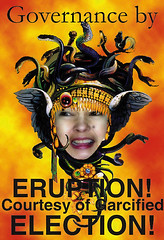Philippine Commission on Audit Urge to Restore Pre-Audit
Subject: COA officilas should not doubt the wisdom of COA Circular 2009-002 - because it is wrongdoing on their part not to restore partial COA pre-audit.
It is quite evident that COA officials had great reluctance in reinstating selective (or partial) COA pre-audit of government transactions. Staggering cases of corruption took place left and right since years ago and they were not moved to reinstitute it. Concerned citizens, including former COA Commissioner Silvestre Sarmiento and my humble self, repeatedly recommended it and yet COA officials took their own sweet time in years before favorably acting on it.
COA officials have to know that the public is aware of COA’s constitutional mandate against corruption and its obligation to fulfil that mandate. Along this line, COA officials should not doubt even for a moment the wisdom of their COA Circular 2009-002 which reinstates partial COA pre-audit--because there is no other way. Under existing conditions in the graft-ridden government bureaucracy, there is simply no alternative to it. What’s more, as shown in the annexed comparison of the present 100% COA post audit and the long abolished pre-audit, IT IS WRONGDOING ON THE PART OF COA OFFICIALS NOT TO REINSTATE PARTIAL COA PRE-AUDIT, therefore the 12,000-strong COA organization owes it to the people to do its best towards its successful implementation.
The people pin their hope on COA in the prevention of continuing corruption in government, as expressed in my first article on corruption dated February 12, 2005 entitled “Re-inventing the Commission on Audit,” posted to Dapat Tapatt website managed by columnist Antonio Abaya. To quote from my article addressed to Mr. Abaya and requested to be relayed to the then COA Chairman:
In reality, however, the reinstitution of partial COA pre-audit is not just four years late. It is more than 21 years late, for it should have been reinstated right upon the dismantling of martial law and the ratification of the present 1987 Constitution, which created an independent and powerful Commission on Audit. It should have been reinstated right then as the first opportunity to correct the unwarranted substantial abolition of COA pre-audit during martial law years in deference to the feared martial law administration. The correction has to be done for the following reason:
Making COA pre-audit succeed is easier said than done and will certainly constitute an uphill struggle for COA officials and auditors. The next major struggle then is how to make partial COA pre-audit succeed. The basic strategy is, I suppose, for COA officials to manage the manageable—for them to concentrate on and prioritize the really large-amount procurement and infrastructure government projects, or those most susceptible to big-time corruption involving billions upon billions of pesos in lost public funds.
To begin with, they have to make a thorough review of the existing public bidding process and rid it of vulnerabilities to corruption, as well as invoke COA’s constitutional powers and impose, through COA circular which has the force of law, the conduct of public bidding for all big-ticket government projects—including those under executive agreements with foreign governments (like the ZTE-NBN deal), but excluding those involving emergencies where time is of the essence because lives and property are at risk of loss or damage. This is in compliance with the constitutional mandate to COA to promulgate accounting and auditing regulations “for the prevention and disallowance of irregular, unnecessary, excessive, extravagant, or unconscionable expenditures....”
To avoid rampant COA disallowances on incurrence and payment of government expenditures, one of my earlier recommendations may seem trivial to COA officials but, based on my own experience as former government Chief Accountant, it is of paramount importance not only to government Chief Accountants but also to all other government officers and employees who participate in the proper documentation, approval, and execution of government transactions. Whether COA is on 100% post audit or partial pre-audit system, if it has not yet done so, it is a must that it prepare and issue—through a COA circular—a uniform and authoritative CHECKLIST of COA DOCUMENTATION REQUIREMENTS for each type of GOVERNMENT EXPENDITURE, as recommended in one of my successive 13 emails to COA in early 2008, in effect followed up in herein ANNEX B.
Why it is Wrongdoing on Part of COA Officials Not to Reinstate Selective COA Pre-audit
The reinstitution of partial COA pre-audit does not mean that what have been written about COA pre-audit and post audit have become academic and should be forgotten. The writings on the wisdom of COA pre-audit and related matters have to be preserved as part of historical record to show: (1) the role of past and present COA Commissioners in the heretofore continuing corruption that have taken place owing to their stubborn refusal to promptly restore selective pre-audit despite the obvious great need for it, (2) the theoretical and practical foundation of COA pre-audit so that it is appreciated better and never again abolished, and (3) some lessons and suggestions towards the successful implementation of partial COA pre-audit.
Accordingly, the following excerpts from my manuscript on the national corruption problem are attached:
MARCELO L. TECSON
Concerned Citizen
It is quite evident that COA officials had great reluctance in reinstating selective (or partial) COA pre-audit of government transactions. Staggering cases of corruption took place left and right since years ago and they were not moved to reinstitute it. Concerned citizens, including former COA Commissioner Silvestre Sarmiento and my humble self, repeatedly recommended it and yet COA officials took their own sweet time in years before favorably acting on it.
COA officials have to know that the public is aware of COA’s constitutional mandate against corruption and its obligation to fulfil that mandate. Along this line, COA officials should not doubt even for a moment the wisdom of their COA Circular 2009-002 which reinstates partial COA pre-audit--because there is no other way. Under existing conditions in the graft-ridden government bureaucracy, there is simply no alternative to it. What’s more, as shown in the annexed comparison of the present 100% COA post audit and the long abolished pre-audit, IT IS WRONGDOING ON THE PART OF COA OFFICIALS NOT TO REINSTATE PARTIAL COA PRE-AUDIT, therefore the 12,000-strong COA organization owes it to the people to do its best towards its successful implementation.
The people pin their hope on COA in the prevention of continuing corruption in government, as expressed in my first article on corruption dated February 12, 2005 entitled “Re-inventing the Commission on Audit,” posted to Dapat Tapatt website managed by columnist Antonio Abaya. To quote from my article addressed to Mr. Abaya and requested to be relayed to the then COA Chairman:
Happily, you need not look far and wide to find the one person who can contribute practically half of the national effort against corruption, for he is right with your organization, a trustee of Tapatt Foundation Inc.—the Honorable Guillermo Carague, Chairman of the Commission on Audit. As such, he can mobilize the sleeping giant COA towards the assumption of a more active role in fraud prevention in the government, such as by partially restoring badly needed pre-audit in the disbursement of the national and local governments' staggering more than trillion-peso annual budget.Looking back, reckoned from my February 2005 first article on the need for selective COA pre-audit—which was followed by my series of follow-up emails/letters to COA in December 2005, then in 2007, 2008, and 2009—it took more than four years for COA Commissioners to eventually issue its May 18, 2009 COA Circular No. 2009-002 which, as amended, reinstitutes selective COA pre-audit effective August 1, 2009.
In reality, however, the reinstitution of partial COA pre-audit is not just four years late. It is more than 21 years late, for it should have been reinstated right upon the dismantling of martial law and the ratification of the present 1987 Constitution, which created an independent and powerful Commission on Audit. It should have been reinstated right then as the first opportunity to correct the unwarranted substantial abolition of COA pre-audit during martial law years in deference to the feared martial law administration. The correction has to be done for the following reason:
The government’s internal control system has become weak since the very first day COA abolished pre-audit—because since then, COA HAS UNWISELY GIVEN COMPLETE CONTROL OVER THE EXECUTION OF GRAFT-PRONE GOVERNMENT TRANSACTIONS TO THE GRAFT-RIDDEN GOVERNMENT BUREAUCRACY!!!Indeed, the cited COA circular maybe 21 years late in coming, but it is a most welcome development. I wish COA officials and auditors success in its implementation—for the sake of the people.
Making COA pre-audit succeed is easier said than done and will certainly constitute an uphill struggle for COA officials and auditors. The next major struggle then is how to make partial COA pre-audit succeed. The basic strategy is, I suppose, for COA officials to manage the manageable—for them to concentrate on and prioritize the really large-amount procurement and infrastructure government projects, or those most susceptible to big-time corruption involving billions upon billions of pesos in lost public funds.
To begin with, they have to make a thorough review of the existing public bidding process and rid it of vulnerabilities to corruption, as well as invoke COA’s constitutional powers and impose, through COA circular which has the force of law, the conduct of public bidding for all big-ticket government projects—including those under executive agreements with foreign governments (like the ZTE-NBN deal), but excluding those involving emergencies where time is of the essence because lives and property are at risk of loss or damage. This is in compliance with the constitutional mandate to COA to promulgate accounting and auditing regulations “for the prevention and disallowance of irregular, unnecessary, excessive, extravagant, or unconscionable expenditures....”
To avoid rampant COA disallowances on incurrence and payment of government expenditures, one of my earlier recommendations may seem trivial to COA officials but, based on my own experience as former government Chief Accountant, it is of paramount importance not only to government Chief Accountants but also to all other government officers and employees who participate in the proper documentation, approval, and execution of government transactions. Whether COA is on 100% post audit or partial pre-audit system, if it has not yet done so, it is a must that it prepare and issue—through a COA circular—a uniform and authoritative CHECKLIST of COA DOCUMENTATION REQUIREMENTS for each type of GOVERNMENT EXPENDITURE, as recommended in one of my successive 13 emails to COA in early 2008, in effect followed up in herein ANNEX B.
Why it is Wrongdoing on Part of COA Officials Not to Reinstate Selective COA Pre-audit
The reinstitution of partial COA pre-audit does not mean that what have been written about COA pre-audit and post audit have become academic and should be forgotten. The writings on the wisdom of COA pre-audit and related matters have to be preserved as part of historical record to show: (1) the role of past and present COA Commissioners in the heretofore continuing corruption that have taken place owing to their stubborn refusal to promptly restore selective pre-audit despite the obvious great need for it, (2) the theoretical and practical foundation of COA pre-audit so that it is appreciated better and never again abolished, and (3) some lessons and suggestions towards the successful implementation of partial COA pre-audit.
Accordingly, the following excerpts from my manuscript on the national corruption problem are attached:
ANNEX A:For the information and attention of all concerned.
THE DISGRACEFUL IMPACT OF COA’S ILL-ADVISED PURSUIT OF POST AUDIT AND ABOLITION OF PRE-AUDIT:
MORE THAN TRILLION-PESO CORRUPTION OVER THE YEARS
ANNEX B:
COMPARISON OF COA POST AUDIT AND PRE-AUDIT SHOWS THAT IT IS WRONGDOING ON PART OF COA OFFICIALS NOT TO RESTORE PARTIAL COA PRE-AUDIT
ANNEX C:
WHAT COA HAS TO LIVE DOWN IN HISTORY:
ANATOMY OF CORRUPTION—THE P728-MILLION PREVENTABLE BUT NOT PREVENTED FERTILIZER SCAM
MARCELO L. TECSON
Concerned Citizen

POGB will not sell, exchange, use or allow any 3rd party access to your email for
any other purposes without exception, email exclusively for article updates only.
























1 Speak Out:
SUBIC WATER DISTRICT
SUBIC,ZAMBALES.....sound good because of Subic....why all people of subic did not realize on what accounting of water district have.Is there something wrong in accounting or wrong of Property Custodian.Subic people,do we know where did Subic Water District account the old meter that they are change?.If we did not know, maybe it is on junk shop and it take part by part of the one who done.Why we did not ask this question to them.Or,maybe it was tolerated by in the highest position of company.Please Comission on Audit audit this kind of GHOST ACCOUNT.Imagine if there is 5,000 members multiply by 75 pesos per pc of meter equals 375,000 pesos. More or less a half million was lost....Please...Please, make a move for this.Calling COMMISSION ON AUDIT (COA)and LOCAL WATER UTILITIES ADMINISTRATION (LWUA)
Thank You.
Post a Comment